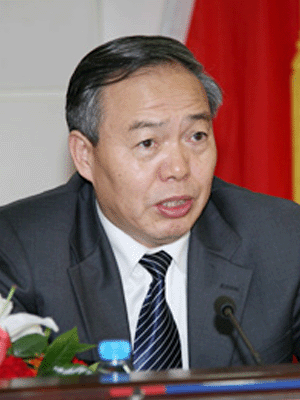Around 100 of the world's top think tanks are expected to attend a Global Think Tank Summit in Beijing on July 3-4. The summit has been organized by China's newest think tank, the China Center for International Economic Exchanges (CCIEE). Zheng Xinli, vice president of CCIEE, spoke to the People's Daily about the new think tank.
 |
|
Zheng Xinli [Photo: people.com.cn]
|
Q: What was the thinking behind setting up a think tank staffed by so many big-hitters?
A: Think tanks reflect the "soft power" of a country and are playing an increasingly important role in political and economic decision-making worldwide. The global financial crisis has been a reminder of the need to tackle problems that have been neglected over the last 30 years of economic and social development, and think tanks have an important role to play in this.
The CCIEE is aiming to become the top non-governmental think tank in China, to produce authoritative studies, and provide public policy makers and multinational business leaders with intellectual support and counseling.
Q: What is special about the CCIEE compared with other research institutions?
A: The CCIEE is a young organization compared with the Development Research Center of the State Council (DRC), the Chinese Academy of Social Sciences (CASS) or the Academy of Macroeconomic Research (AMR) of the National Development and Reform Commission. Our strength lies in our highly-educated, respected and experienced research team, which is the core of a successful think tank.
Former vice premier Zeng Peiyan is President of CCIEE, and Wei Jianguo, former deputy head of the Ministry of Commerce, is Secretary-General. Other council members include senior officials such as Li Rongrong (director of the State-owned Assets Supervision and Administration Commission), Zhang Xiaoqiang and Zhang Guobao (vice directors of the National Development and Reform Commission); financial experts such as Chen Yuan (chairman of the board of the China Development Bank), Lou Jiwei (chairman of the board of the China Investment Corporation) and Dai Xianglong (chairman of the board of the National Council for Social Security Fund); former senior government officials with a deep understanding of macro-economic policies including Teng Wensheng (former director of the Central Policy Research Office), Wang Chunzheng (former director of the Office of the Central Leading Group on Finance and Economy Work), Wei Liqun (former director of the Research Office of the State Council), Liu Huaqiu (former director of the Office of the Foreign Affairs Leading Group of the CPC Central Committee) and Lu Ruihua (former governor of Guangdong Province); and academic specialists capable of leading research projects such as Li Yining (a Peking University professor) and Professor Lawrence J Lau (vice-chancellor and president of the Chinese University of Hong Kong).
Institutions like the DRC or the CASS specialize in economic theory and China's domestic economy, while the focus of CCIEE will be the study of international economic strategy and providing proper advice to the central government when needed – "taking shots at goal" as Zeng Peiyan, president of CCIEE, put it. The center attaches importance to both original research and learning lessons from the achievements of other institutions at home and abroad. Since the center was established, it has opened 20 research projects to Internet bidding, and will organize a monthly youth economic summit starting in late June.